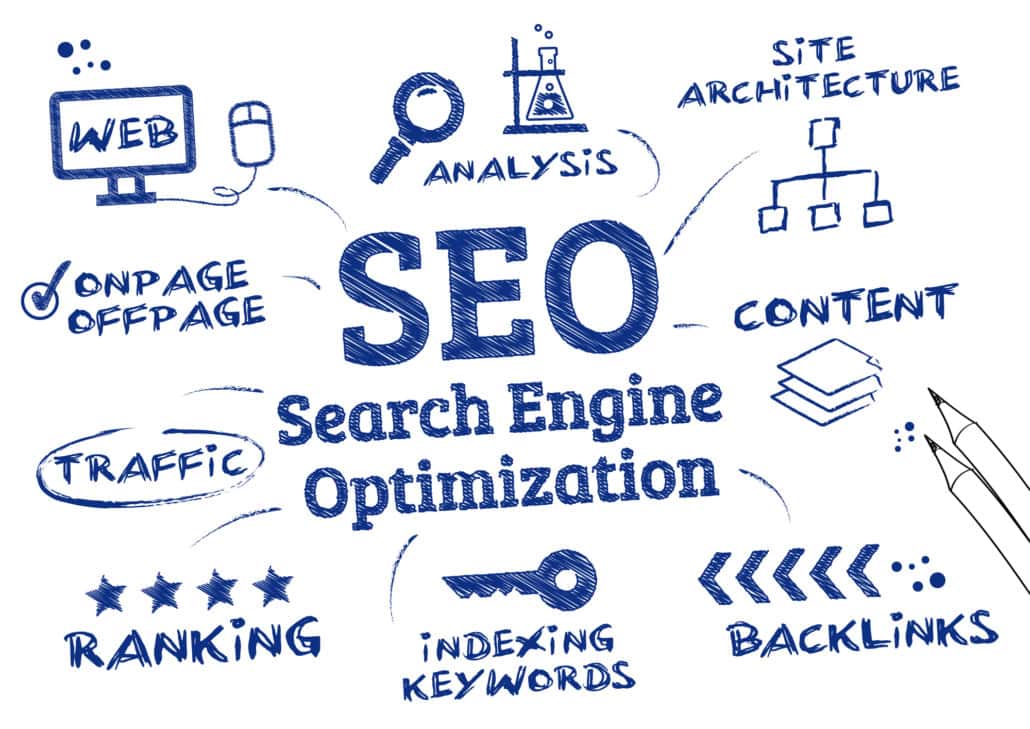Search Engine Optimization for 2025: Strategies That Work

In the vast expanse of the digital world, over 90% of online experiences start with a search engine. SEO, or search engine optimization, is not just an art but a science — one that commands attention with ever-evolving algorithms. It’s the bridge between a company’s online presence and its audience, playing a crucial role in visibility and business reach.
The roots of SEO date back to the 1990s, when metadata and keyword stuffing were game-changers. Today, it’s a sophisticated dance involving content quality, backlinks, and user engagement. Research indicates that websites appearing on the first page of search results receive approximately 75% of the clicks, underscoring the immense potential of well-executed SEO strategies.
Key Takeaways
- SEO boosts website visibility on search engines significantly.
- Effective keyword use is crucial for successful SEO strategies.
- High-quality content increases user engagement and credibility.
- Technical optimization improves site performance and usability.
- Building backlinks enhances site authority and trustworthiness.
The Importance of Search Engine Optimization
Every time you use the internet to find something, you rely on a search engine. SEO is what makes it possible for websites to appear in the results you see. It’s like shining a spotlight on the best parts of your website, guiding users to your content. According to this post, SEO is crucial because it helps websites get noticed. Without it, amazing content could be lost on the internet, unseen by potential readers.
SEO does more than just boost website traffic. It builds trust by aligning with search engine requirements, enhancing user experience. People usually trust websites that rank higher, which can lead to increased sales or followers. Here is a table that explains why SEO matters even more:
| Importance | Benefits |
|---|---|
| Visibility | More website visitors |
| Credibility | Improved trust with users |
| User Experience | Better website interaction |
Businesses of all kinds see great results when they use SEO effectively. Here is the article explaining some efficient techniques businesses apply. These SEO strategies can transform how companies reach their audiences. By creating relevant content, using keywords correctly, and optimizing links, businesses draw in more users. It’s a game changer in the competitive online world.
The digital landscape is constantly evolving, making SEO vital for every website. Staying up-to-date with optimization practices ensures continued success online. For more on advanced SEO techniques, check out here is the article. As search engines update, so must the strategies. It’s important for websites to keep improving to remain relevant in search results.
Role of SEO in Digital Marketing
SEO is a cornerstone in digital marketing, impacting everything from content creation to audience engagement. It ensures that content reaches the right people at the right time, making it a vital tool for marketers. When businesses utilize SEO, they improve their online presence and connect with more potential customers. This connection drives brand visibility and loyalty, which are essential in today’s digital age. SEO isn’t just about keywords; it’s about understanding your audience’s needs.
Effective SEO strategies can increase website traffic significantly. Marketers focus on using relevant keywords to attract targeted audiences. These visitors are more likely to turn into customers, leading to higher conversion rates. Here’s a breakdown on how SEO benefits marketing efforts:
| Benefit | SEO Impact |
|---|---|
| Increased Traffic | Higher website visits |
| Target Audience | Reaching specific groups |
| Conversions | Turning visitors into customers |
As part of a well-rounded digital marketing plan, SEO boosts brand authority. This means when a business consistently appears in top search results, it gains trust with its audience. Many consumers research online before making purchases, and a strong SEO strategy fulfills this research demand. It’s not just about being visible; it’s about being credible in the marketplace.

In the digital marketing mix, SEO supports other marketing strategies such as social media and email campaigns. It provides the groundwork that enhances other methods by bringing more eyes to their content. This synergy increases the chances of capturing the market’s attention. Further refining these strategies ensures businesses maximize their potential. As digital trends change, SEO adapts to maintain that vital connection with the audience.
Understanding the SEO Process
The SEO process begins with researching the right keywords that your audience might use. These keywords guide the creation of content that responds directly to user queries. By incorporating specific keywords naturally into your website, search engines understand what your pages are about. This helps them rank your site when people search online. The trick is to choose keywords that are both relevant and have a good search volume.
Once the keywords are decided, the next step is on-page optimization. This includes using the keywords in titles, headings, and throughout the content to improve relevance. It’s also important to make sure pages are easy to navigate, enhancing the user experience. Here’s a list of critical on-page SEO elements:
- Page Title
- Meta Descriptions
- Header Tags
- Content Quality
Off-page SEO is another part of the process that boosts a site’s reputation. This involves activities away from the website, like building backlinks from other sites. Backlinks act like endorsements, signaling trustworthiness to search engines. The more reputable backlinks a site has, the better it can perform in search rankings. This process requires engaging with other site owners and sharing content.
Monitoring and analyzing the results are crucial to understand the effectiveness of your SEO efforts. There are various tools available for tracking website traffic and user behavior. These insights can highlight what strategies are working and what needs adjustment. Making regular updates and optimizations ensures the website remains competitive. This continuous process is key to maintaining SEO success.
Key Elements of SEO Strategy
One of the most important elements of an SEO strategy is selecting the right keywords. Without these, it’s difficult for people to find what they’re searching for online. Good keywords have a balance of high search volume and low competition. Tools like Google Keyword Planner can help find these keywords. Keywords should be placed naturally in your content to maximize impact.
Next, quality content is essential in keeping users engaged and returning to your website. Search engines rank pages higher when they offer valuable and relevant information. It’s not just about stuffing keywords; the content must inform or entertain. Lists can help break up text and make it more digestible. Here are a few things quality content often includes:
- Original insights
- Clear, concise writing
- Engaging multimedia like images or videos
Technical SEO is also a significant part of the strategy. This includes optimizing the site’s structure for better crawling and indexing by search engines. It’s crucial to ensure the website loads quickly and is mobile-friendly. Fixing broken links and improving site navigation also play a role. Search engines give better rankings to websites that are easy to navigate.
Building credible backlinks from other reputable websites contributes massively to SEO efforts. These links act like votes of confidence, showing search engines your site is trusted by others. More high-quality backlinks mean higher chances of ranking well. Outreach and collaboration with other sites can help get these valuable links. This makes off-page SEO as vital as on-page practices.
Lastly, monitoring and analyzing SEO performance allows you to make informed decisions. Tools such as Google Analytics give insights into traffic and user behavior. They help identify which strategies are successful and which need changes. Regularly reviewing these metrics keeps your SEO strategy up-to-date and effective. Continuous learning and adjustment make a sustainable SEO plan.
The Impact of SEO on Business Traction
SEO plays a crucial role in driving more visitors to a website, which can significantly increase business traction. By ranking higher in search results, companies can attract more potential customers. A higher ranking builds trust and credibility with users, making them more likely to take action. Moreover, this visibility can lead to increased brand awareness, which is essential in keeping a business competitive. SEO is a valuable asset for reaching audiences that are actively seeking products or services.
When businesses invest in SEO, they see measurable results over time. Websites with strong SEO strategies often experience growth in web traffic, which translates to higher revenue. Here is a table showing some common benefits businesses gain from using SEO:
| Benefit | Impact |
|---|---|
| Improved Visibility | More potential customers find you |
| Higher Sales | Increases in leads and conversions |
| Brand Credibility | Builds trust with audiences |
In addition to boosting traffic and sales, SEO also enhances the overall user experience on a website. Practices like faster loading times and mobile optimization ensure that visitors enjoy their time on a site. This positive experience can encourage users to return, and even recommend the company to others. Happy users are an important part of sustaining long-term business growth. Positive word-of-mouth can expand reach without extra marketing costs.
SEO also provides valuable data about consumer behavior and preferences. With tools to analyze how users interact with a website, businesses can make informed decisions about their marketing strategies. This data can guide improvements and adjustments, ensuring the business stays in tune with customer needs. As search algorithms evolve, maintaining updated SEO practices keeps a business agile and responsive. Staying relevant in search results is crucial for continual traction.
Future Trends in Search Engine Optimization
In the coming years, search engine optimization will increasingly focus on voice search. With more people using digital assistants like Alexa and Siri, optimizing for voice queries is becoming essential. This shift demands a focus on natural language processing and long-tail keywords. These keywords more closely mimic how people talk naturally. Businesses need to adapt by creating content that answers questions directly.
Artificial intelligence (AI) continues to transform the SEO landscape as well. AI helps search engines understand user intent better, which changes how results are ranked. Tools like Google’s BERT algorithm are already making an impact. This trend means content will need to be more complex and informative, answering users’ queries accurately. AI’s role in SEO ensures that search engines continue delivering relevant, high-quality content to users.
Video content is gaining prominence in search results, signaling another trend. Platforms like YouTube are search engines in their own right, with billions of searches each day. To keep up, businesses are focusing on optimizing video content with descriptive titles, tags, and transcriptions. This strategy not only improves visibility but also engages users through a highly interactive medium. Video SEO is becoming a pillar of comprehensive digital marketing strategies.
As technology evolves, mobile-first indexing remains a crucial trend. Google now predominantly uses the mobile version of content for indexing and ranking, emphasizing the need for mobile optimization. Websites that load quickly and function well on mobile devices are prioritized. Ensuring that content is mobile-friendly is vital for staying relevant and accessible to users on the go. The focus on mobile optimization demonstrates the growing importance of user experience.
Moreover, user experience will remain a central theme in SEO trends. Factors such as page speed, easy navigation, and secure connections carry more weight in search rankings. A positive user experience keeps visitors engaged and can lead to higher search rankings. Therefore, businesses must prioritize site usability and performance. Enhancing user experience aligns with SEO goals, benefiting both search engines and audiences alike.
Conclusion
In the ever-evolving digital landscape, search engine optimization remains a powerful tool for ensuring online success. By focusing on strategic keyword use, mobile optimization, and quality backlinks, businesses can significantly enhance their visibility. These efforts not only boost traffic but also establish credibility and trust with users, fostering long-term engagement.
As algorithms and user habits change, staying informed and adaptable is crucial. Embracing future trends such as voice search and AI will keep businesses ahead of the curve. SEO is not just a one-time effort but a continuous process that demands attention, innovation, and commitment to maintain a competitive edge.
Frequently Asked Questions
SEO is a vital tool in the digital world, enhancing website visibility and engagement. Here we answer some common questions about how SEO works and why it’s important.
1. How does keyword research impact SEO?
Keyword research is the backbone of SEO strategies. By identifying what terms users are searching for, businesses can tailor their content to meet these needs. This ensures that users find the most relevant information quickly, improving their experience on the site. Effective keyword use can drive more traffic to a website, increasing its visibility and potential for conversions.
Using data-driven tools for keyword research helps in understanding search volume and competition. Keywords should fit naturally into the content to maintain quality and engagement. Balancing between high-volume and low-competition keywords can significantly boost site rankings. Regular updating of keywords is essential to keep up with changing search trends.
2. Why is mobile optimization important for SEO?
With more people using smartphones for browsing, mobile optimization has become crucial for good SEO. A site that loads well on mobile devices can improve user experience, leading to higher engagement and better rankings. Search engines prioritize sites optimized for mobile, giving them an advantage in search results.
Ensuring a mobile-friendly design involves responsive layouts and fast loading times. When a website meets these criteria, it not only ranks better but also retains visitors longer. This has a direct impact on business success, as users are more likely to revisit and recommend the site to others.
Backlinks are links from one site to another, acting like endorsements for your content. When reputable websites link to your site, it signals to search engines that your content is valuable and trustworthy. This can boost your site’s authority, improving its position in search results.
Building quality backlinks requires strategic outreach and content sharing. It’s important to focus on getting links from sites relevant to your industry. Engaging in guest blogging and collaborations can help earn more backlinks. Over time, strong backlinks can significantly enhance site credibility.
4. What role does content quality play in SEO?
High-quality content is essential for effective SEO as it keeps users engaged and informed. Search engines assess the value of content based on its relevance, originality, and user engagement. When content answers users’ queries well, it tends to rank higher, increasing visibility and attracting more visitors.
Creating engaging content means using clear language and providing useful insights. Visual elements like images and videos can enhance the experience further. Consistent updates and additions to content can maintain its relevance over time, ensuring continued access to an interested audience.
5. How can SEO analytics tools improve strategy?
SEO analytics tools provide insights into how a website is performing. They help track metrics like traffic, bounce rates, and user engagement. Understanding these stats allows businesses to refine their SEO strategies by identifying what’s working and what isn’t.
Using these tools, companies can make data-driven decisions that enhance their online presence. They can spot trends and adjust keywords or content to meet user needs better. Regular analysis ensures that SEO efforts align with business goals, maximizing the effectiveness of the strategy.





